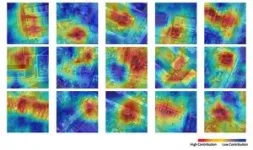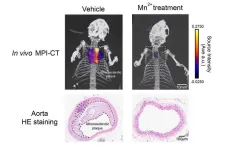(Press-News.org) Osaka, Japan – When you think of Japan in the age of COVID, you might imagine a crowd of people wearing masks. But why do so many Japanese people wear masks?
In an article published this month in the International Journal of Disaster Risk Reduction, a researcher from Osaka University analyzed mask use before and after the government of Japan downgraded the legal status of COVID-19. Results showed that many people continue to wear masks for socio-psychological reasons – including reasons related to ‘relief’ and ‘norm’.
Of course, the obvious motivation for mask use is disease prevention. In the first half of 2020, masks were recommended worldwide because they help to prevent COVID-19 transmission. Japan has since had one of the highest rates of mask usage throughout the pandemic.
However, on May 5, 2023, the World Health Organization declared the end of COVID-19 as a global health emergency. Furthermore, on May 8, Japan downgraded the legal status of COVID-19 to the same level as seasonal influenza.
Michio Murakami, the study’s author, notes, “The online survey shows that 59% of Japanese participants are still wearing masks, even after the downgrading of the legal status of COVID-19. That is only slightly down from 67%, which was before the downgrading.”
The surveys were conducted among people aged 20 to 69 in Japan. The first survey was performed in April 2023, before the policy changes, while the second was performed after the changes in June 2023. A total of 291 participants completed both surveys.
So what reasons, besides disease prevention, might lead people to continue wearing masks? “One common socio-psychological reason involves what we call ‘relief’. This means that wearing a mask can help relieve anxiety for many people,” explains Murakami. “There’s a second sociological reason, too: a ‘norm’. This refers to when people think they should wear a mask because they see others wearing masks,” he explains. People that have this trait are more likely to wear a mask when others around them are wearing masks, unsurprisingly.
Murakami was also able to document correlations between mask-usage motivations and actual mask usage. For instance, citing psychological reasons for mask use in April was correlated with actually wearing a mask later on in June. Furthermore, wearing a mask in April was associated with citing infection avoidance as a reason to wear masks in June.
“So many Japanese people prefer to wear masks,” notes Murakami. “This study helps us understand why people might do so, even in light of reduced infection risk.”
###
The article, “Bi-directional associations between mask usage and beliefs about reasons for masking before and after the downgrading of the legal status of COVID-19 in Japan: A longitudinal study,” was published in the International Journal of Disaster Risk Reduction at DOI: https://doi.org/10.1016/j.ijdrr.2023.104072
About Osaka University
Osaka University was founded in 1931 as one of the seven imperial universities of Japan and is now one of Japan's leading comprehensive universities with a broad disciplinary spectrum. This strength is coupled with a singular drive for innovation that extends throughout the scientific process, from fundamental research to the creation of applied technology with positive economic impacts. Its commitment to innovation has been recognized in Japan and around the world, being named Japan's most innovative university in 2015 (Reuters 2015 Top 100) and one of the most innovative institutions in the world in 2017 (Innovative Universities and the Nature Index Innovation 2017). Now, Osaka University is leveraging its role as a Designated National University Corporation selected by the Ministry of Education, Culture, Sports, Science and Technology to contribute to innovation for human welfare, sustainable development of society, and social transformation.
Website: https://resou.osaka-u.ac.jp/e
END
Research examines why mask usage in Japan persists
Research out of Osaka University sheds light on mask usage in Japan before and after the downgrading of the legal status of COVID-19. Besides disease prevention, people use masks for sociological and psychological reasons
2023-11-02
ELSE PRESS RELEASES FROM THIS DATE:
Exercise therapy based on smart data to improve patients' quality of life
2023-11-02
Regular and moderate physical activity can significantly improve the quality of life of people with internal diseases such as cancer and depression. Unfortunately, many people with internal disorders cannot sufficiently participate in exercise training for several reasons. For example, they often do not have access to appropriate exercise training programs, have a high therapeutic burden, fatigue, or simply no time to engage in physical activity. Accordingly, the Sports Medicine research group led by Professor Perikles Simon at Johannes Gutenberg University Mainz (JGU) investigates how physical activity can be promoted and integrated into patients' daily lives by applying digital tools ...
Alternative antibiotic selection can reduce the risk of healthcare-associated infections for patients with pneumonia
2023-11-02
Arlington, Va. — November 2, 2023 — A new study published today in the American Journal of Infection Control (AJIC) reveals that the use of doxycycline may help protect against Clostridioides difficile (C. diff) infection for some patients with pneumonia. Specifically, study authors found that for hospitalized patients with community-acquired pneumonia who had experienced C. diff infections in the prior year, the use of doxycycline, instead of the more commonly used azithromycin, reduced the development ...
Survey finds most Americans are unaware of many signs that someone is having a seizure
2023-11-02
Orlando, Fla - If you’ve ever seen a movie or TV show in which a character has a seizure, you probably have a fairly standard mental picture of someone falling to the ground in full body convulsions while foaming at the mouth. But that doesn’t necessarily reflect reality. A new national survey by Orlando Health finds that while most Americans recognize those classic symptoms of what’s called a generalized tonic-clonic seizure, the majority fail to recognize the subtle signs, all of which can be dangerous and have a profound ...
A “manganese bullet” targeting the top killer?
2023-11-02
Cardiovascular diseases (CVDs) continue to rank as the top killer in the modern world. This deadly disorder often starts with the buildup of lipid deposits or plaques within the blood vessel, silently setting the stage for atherosclerosis. Rupture of these atherosclerotic plaques, however, could clot blood vessels and lead to life-threatening conditions including heart attack or stroke.
Dyslipidemia, meaning having too much “bad” or atherogenic lipids in the blood, represents the most common cause of CVDs and ...
New NUS study provides insights into early breast cancer development in individuals with BRCA2 mutations
2023-11-02
A pioneering study led by Professor Ashok Venkitaraman from the Cancer Science Institute of Singapore (CSI Singapore) at the National University of Singapore and Dr Mona Shehata from the University of Cambridge (UK) has uncovered vital insights into the distinct effects of BRCA2 mutations on breast tissue cells, shedding light on early breast cancer development in people with BRCA2 mutations. The research was published in the prestigious journal Nature Communications on 25 August 2023.
Breast cancer is a serious concern for individuals with BRCA2 mutations, ...
Clinical intervention directed at social risks does not increase experiences of discrimination
2023-11-02
A growing recognition of the health impact of social risks – such as food insecurity and homelessness – has prompted researchers, healthcare providers and policymakers to consider ways to address these risk factors as part of holistic clinical care. However, some healthcare providers worry the same interventions designed to help patients and families with social risks might also make them feel singled out or like they are otherwise stigmatized.
Now, new results of a rigorous study from the University of Chicago Medicine published October 2023 in JAMA Pediatrics suggest well-designed interventions that address social risks can be provided ...
$13M NIH grant funds research aimed at revitalizing immune systems of older adults
2023-11-02
University of Arizona Health Sciences researchers received a $13.1 million grant from the National Institute on Aging to continue studies aimed at rejuvenating the immune system of older people in order to improve health throughout the lifespan.
Older adults are disproportionally affected by infection, cancer and certain types of autoimmune disease. This is influenced by the fact that as a person ages, their body produces fewer T cells and gets less proficient at maintaining them. T cells are a type of white blood cell essential to the immune ...
Study provides preliminary evidence in favor of a new type 1 diabetes treatment
2023-11-02
Type 1 diabetes is an autoimmune disease that causes the body's immune system to attack and destroy insulin-producing beta cells in the pancreas. Traditional management of type 1 diabetes has primarily involved replacing the missing insulin with injections which, though effective, can be expensive and burdensome. A new study led by researchers at the University of Chicago Medicine and Indiana University suggests that an existing drug could be repurposed to treat type 1 diabetes, potentially reducing dependence on insulin as the sole treatment.
The research centers on a medication known as α-difluoromethylornithine (DFMO), which inhibits an enzyme that plays a key role in cellular ...
New branch of oncology, cancer neuroscience, offers hope for hard-to-treat brain tumors
2023-11-02
Cancer cells hijack normal biological processes, allowing them to multiply. For example, tumors spur construction of new blood vessels, building themselves “highways” to supply nutrients.
Researchers have known about cancer’s blood vessel infiltration for decades, but it was only in the past few years that Stanford Medicine scientists and their colleagues discovered that tumors don’t just tap the body’s highway system; they can also infiltrate and exploit its “telecommunications.”
To ...
Less physical activity in adolescence likely rooted in biology
2023-11-02
AURORA, Colo. (Nov. 1, 2023) – The slowdown of physical activity during adolescence is not likely caused by lifestyle and environment but by energy demands placed on the body as it grows and sexually matures, according to a new study by researchers at the University of Colorado Anschutz Medical Campus.
The study, published today in the Proceedings of the Royal Society B, examined the lifestyles of the physically active Tsimane people, an indigenous population of forager-horticulturalists in lowland Bolivia, to see similarities and differences to adolescents living in post-industrialized nations.
“We wanted to look at the role of environment and the role of biology,” ...
LAST 30 PRESS RELEASES:
Hairdressers could be a secret weapon in tackling climate change, new research finds
Genetic risk for mental illness is far less disorder-specific than clinicians have assumed, massive Swedish study reveals
A therapeutic target that would curb the spread of coronaviruses has been identified
Modern twist on wildfire management methods found also to have a bonus feature that protects water supplies
AI enables defect-aware prediction of metal 3D-printed part quality
Miniscule fossil discovery reveals fresh clues into the evolution of the earliest-known relative of all primates
World Water Day 2026: Applied Microbiology International to hold Gender Equality and Water webinar
The unprecedented transformation in energy: The Third Energy Revolution toward carbon neutrality
Building on the far side: AI analysis suggests sturdier foundation for future lunar bases
Far-field superresolution imaging via k-space superoscillation
10 Years, 70% shift: Wastewater upgrades quietly transform river microbiomes
Why does chronic back pain make everyday sounds feel harsher? Brain imaging study points to a treatable cause
Video messaging effectiveness depends on quality of streaming experience, research shows
Introducing the “bloom” cycle, or why plants are not stupid
The Lancet Oncology: Breast cancer remains the most common cancer among women worldwide, with annual cases expected to reach over 3.5 million by 2050
Improve education and transitional support for autistic people to prevent death by suicide, say experts
GLP-1 drugs like Ozempic could cut risk of major heart complications after heart attack, study finds
Study finds Earth may have twice as many vertebrate species as previously thought
NYU Langone orthopedic surgeons present latest clinical findings and research at AAOS 2026
New journal highlights how artificial intelligence can help solve global environmental crises
Study identifies three diverging global AI pathways shaping the future of technology and governance
Machine learning advances non targeted detection of environmental pollutants
ACP advises all adults 75 or older get a protein subunit RSV vaccine
New study finds earliest evidence of big land predators hunting plant-eaters
Newer groundwater associated with higher risk of Parkinson’s disease
New study identifies growth hormone receptor as possible target to improve lung cancer treatment
Routine helps children adjust to school, but harsh parenting may undo benefits
IEEE honors Pitt’s Fang Peng with medal in power engineering
SwRI and the NPSS Consortium release new version of NPSS® software with improved functionality
Study identifies molecular cause of taste loss after COVID
[Press-News.org] Research examines why mask usage in Japan persistsResearch out of Osaka University sheds light on mask usage in Japan before and after the downgrading of the legal status of COVID-19. Besides disease prevention, people use masks for sociological and psychological reasons



